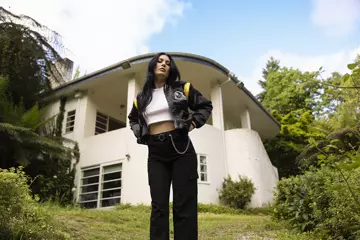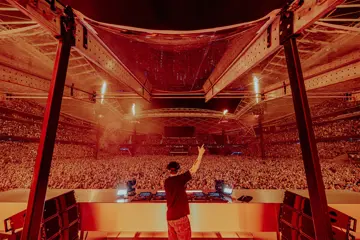Hassan is on the phone from Amsterdam, still getting used to Savages' current jet-setting itinerary: “I don't particularly like flying, so it was certainly never my plan to fly around this much,” she offers. And still getting used to her band's status as 2013's most hyped indie band.
Hype can be both a blessing and a curse, especially in the way that it's something that happens to bands; bestowing powerlessness as the hype becomes an entity unto itself. It opens doors, demands listeners to pick a side, and, at times, sounds like a pejorative; the 'hype' band often understood as being empty or ephemeral. Savages – who found videos of their first-ever show instantly bandied around blogs, and were the subject of a Pitchfork 'Cover Story' before they'd pressed their first single – find themselves having to talk about hype a lot; far more time than they ever spend thinking about it.
“We're constantly thinking about our live shows and recordings and songwriting, so we don't necessarily see that hype,” Hassan says. “It can be frustrating, because hype seems like a negative word. And I want people to make up their own minds about us, good or bad, based on what they think, not based on hype.”
Like any new-millennial hype band, there's a division of opinions, from breathless coronations to backlash condemnations; Savages' obvious debt to old post-punk bands (Siouxsie and the Banshees, the Au Pairs, Liliput) being something that can be both commended and derided. One thing that's reached an agreed-upon consensus, though, is that Savages are, first and foremost, a live band, and a particularly good one at that. Where so many buzz-bands of the blogosphere are feted before they've ever played a show, and then struggle to deliver on the hype on stage, Savages are already a commanding live proposition.
Don't miss a beat with our FREE daily newsletter
“From the very beginning this has always been about being a live band,” says Hassan. “From that, everything else followed on, like the fact that we wanted to capture the energy of our live shows on our records. We always hoped that we'd give our audience something really interesting to listen and watch and enjoy. I've been to so many gigs where it all follows the same run-of-the-mill passage, where you have that feeling of sitting through the two opening bands that you don't necessarily like. We wanted to make sure our live shows were an event, that you would come along not being sure of what you'd see or hear. We'd tailor everything from the music we'd play in between acts to what you see when you arrive. I think that's really important, because it keeps it interesting for both the audience and for us. We've been really truthful to ourselves with this project, in all the steps we've taken along the way: from the recording process to the songwriting to the live show. Even what shows we play, and who we play with, those are all things that we've thought carefully about.”
Savages is built along the tense, high-strung interplay of Gemma Thompson's bent, angular, abrasive guitar-playing and Hassan's coiled, menacing bassplaying. “Menacing?” Hassan laughs. “I wouldn't totally disagree. I think perhaps 'menacing' could also be 'passionate'. I like to think I play pretty intensely, putting my everything into that moment.”
Then there's also the vocals of Jehnny Beth, the band's fearsome, ferocious singer. It's she who furthers the at times political edge to the band's post-punk delivery. Their debut LP, Silence Yourself, explores issues of politics in both social, political and physical ways: body politics, personal politics and theatrical politics (they borrow Harold Pinter's “Don't let the fuckers get you down” as a motto) at play throughout. The album's title and its poetic cover art (with lament-for-the-Twitter-generation lines like “you are distracted/you are available/you want flattery”) seems to forward an essential thesis: that people need to say less, disclose less, share less, but that bands need to say more, communicate more, stand for more. “In our private lives we definitely have the feeling that there's so much going on in the world, and people don't really stop and listen,” Hassan offers. “Even when people are communicating with each other, the true art of listening is really lost. As a musician, you really want people to listen to the music, and formulate their own ideas about what we're trying to do and say. Silence Yourself means quite a lot of things when you stop and look at it. There are too many noises in the world, and sometimes it is to important to step back and formulate your own views and your own ideas about something, rather than just going with these crazy voices that are pulling you each way.”
That cacophony of voices includes, of course, the blogosphere, with its endless proliferation of opinions piling up to create self-contained dialogues about bands; all the hype and the hype about the hype and the backlash on the hype an endless cycle. “Sometimes I feel like it's counterproductive to read things about yourself, because there will naturally be misinterpretations,” Hassan says, about the way the band has been portrayed. “But hopefully, over time, that will get cleared up as people come to shows and come to understand what we're about, and what we're trying to achieve with this. It can be slightly frustrating when something's being perceived in a way that you don't want it to be.” One of those popular perceptions is that the band – as captured on the cover photo of Silence Yourself – are stern, glowering, dark-haired and dark-hearted post-punks. “It's important to take yourself seriously,” shrugs Hassan. “Because we're all putting everything into this. Every day we think about it. Every day we work at it. But, that said, as important as it is to take it seriously, on the other hand you have to have the element of humour with it. It's not totally surprising that may not come through. But anyone who comes to a show or talks to us at a show, it's quite apparent that as much as we take this seriously, and make serious music, there are other sides to us as well, and we are human.”
They're human, and they're also women. And that's something that is written about just as much as hype; Savages set to be seen, by a certain segment of the population, through the prism of a 'girl band'. Yet, despite their make-up, gender was never central to the band's identity. “When we first got together it was us really connecting as individuals, gender didn't really come into the equation,” says Hassan. “I never thought of us in that regard, or what gender could mean to other people. I could see that, outwardly, that could seem intimidating, having four people who are very strong in their thoughts and feelings and convictions in how they make their music. And I could see how that might mean a lot to someone else – another person, a man, a woman, whoever – and if they take inspiration from that then that's a really awesome thing.”















